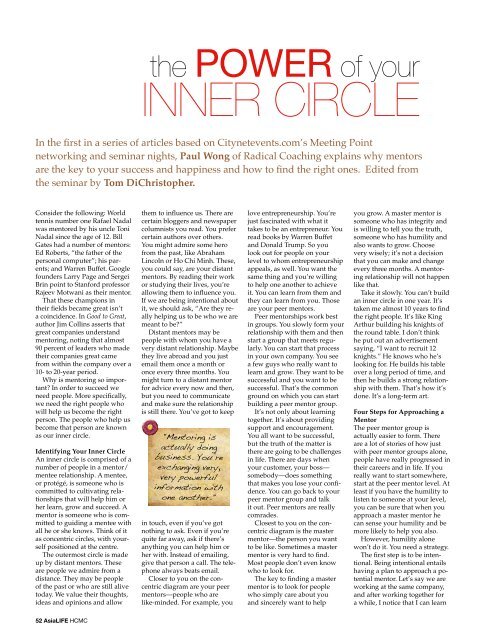Brett Davis - AsiaLIFE Magazine
Brett Davis - AsiaLIFE Magazine
Brett Davis - AsiaLIFE Magazine
You also want an ePaper? Increase the reach of your titles
YUMPU automatically turns print PDFs into web optimized ePapers that Google loves.
the Power of your<br />
Inner Circle<br />
In the first in a series of articles based on Citynetevents.com’s Meeting Point<br />
networking and seminar nights, Paul Wong of Radical Coaching explains why mentors<br />
are the key to your success and happiness and how to find the right ones. Edited from<br />
the seminar by Tom DiChristopher.<br />
"The key to<br />
maintaining your<br />
relationships<br />
with mentors<br />
is structure.<br />
Remember, building<br />
relationships is<br />
tiring."<br />
Consider the following: World<br />
tennis number one Rafael Nadal<br />
was mentored by his uncle Toni<br />
Nadal since the age of 12. Bill<br />
Gates had a number of mentors:<br />
Ed Roberts, “the father of the<br />
personal computer”; his parents;<br />
and Warren Buffet. Google<br />
founders Larry Page and Sergei<br />
Brin point to Stanford professor<br />
Rajeev Motwani as their mentor.<br />
That these champions in<br />
their fields became great isn’t<br />
a coincidence. In Good to Great,<br />
author Jim Collins asserts that<br />
great companies understand<br />
mentoring, noting that almost<br />
90 percent of leaders who made<br />
their companies great came<br />
from within the company over a<br />
10- to 20-year period.<br />
Why is mentoring so important?<br />
In order to succeed we<br />
need people. More specifically,<br />
we need the right people who<br />
will help us become the right<br />
person. The people who help us<br />
become that person are known<br />
as our inner circle.<br />
Identifying Your Inner Circle<br />
An inner circle is comprised of a<br />
number of people in a mentor/<br />
mentee relationship. A mentee,<br />
or protégé, is someone who is<br />
committed to cultivating relationships<br />
that will help him or<br />
her learn, grow and succeed. A<br />
mentor is someone who is committed<br />
to guiding a mentee with<br />
all he or she knows. Think of it<br />
as concentric circles, with yourself<br />
positioned at the centre.<br />
The outermost circle is made<br />
up by distant mentors. These<br />
are people we admire from a<br />
distance. They may be people<br />
of the past or who are still alive<br />
today. We value their thoughts,<br />
ideas and opinions and allow<br />
them to influence us. There are<br />
certain bloggers and newspaper<br />
columnists you read. You prefer<br />
certain authors over others.<br />
You might admire some hero<br />
from the past, like Abraham<br />
Lincoln or Ho Chi Minh. These,<br />
you could say, are your distant<br />
mentors. By reading their work<br />
or studying their lives, you’re<br />
allowing them to influence you.<br />
If we are being intentional about<br />
it, we should ask, “Are they really<br />
helping us to be who we are<br />
meant to be?”<br />
Distant mentors may be<br />
people with whom you have a<br />
very distant relationship. Maybe<br />
they live abroad and you just<br />
email them once a month or<br />
once every three months. You<br />
might turn to a distant mentor<br />
for advice every now and then,<br />
but you need to communicate<br />
and make sure the relationship<br />
is still there. You’ve got to keep<br />
"Mentoring is<br />
actually doing<br />
business. You’re<br />
exchanging very,<br />
very powerful<br />
information with<br />
one another."<br />
in touch, even if you’ve got<br />
nothing to ask. Even if you’re<br />
quite far away, ask if there’s<br />
anything you can help him or<br />
her with. Instead of emailing,<br />
give that person a call. The telephone<br />
always beats email.<br />
Closer to you on the concentric<br />
diagram are your peer<br />
mentors—people who are<br />
like-minded. For example, you<br />
love entrepreneurship. You’re<br />
just fascinated with what it<br />
takes to be an entrepreneur. You<br />
read books by Warren Buffet<br />
and Donald Trump. So you<br />
look out for people on your<br />
level to whom entrepreneurship<br />
appeals, as well. You want the<br />
same thing and you’re willing<br />
to help one another to achieve<br />
it. You can learn from them and<br />
they can learn from you. Those<br />
are your peer mentors.<br />
Peer mentorships work best<br />
in groups. You slowly form your<br />
relationship with them and then<br />
start a group that meets regularly.<br />
You can start that process<br />
in your own company. You see<br />
a few guys who really want to<br />
learn and grow. They want to be<br />
successful and you want to be<br />
successful. That’s the common<br />
ground on which you can start<br />
building a peer mentor group.<br />
It’s not only about learning<br />
together. It’s about providing<br />
support and encouragement.<br />
You all want to be successful,<br />
but the truth of the matter is<br />
there are going to be challenges<br />
in life. There are days when<br />
your customer, your boss—<br />
somebody—does something<br />
that makes you lose your confidence.<br />
You can go back to your<br />
peer mentor group and talk<br />
it out. Peer mentors are really<br />
comrades.<br />
Closest to you on the concentric<br />
diagram is the master<br />
mentor—the person you want<br />
to be like. Sometimes a master<br />
mentor is very hard to find.<br />
Most people don’t even know<br />
who to look for.<br />
The key to finding a master<br />
mentor is to look for people<br />
who simply care about you<br />
and sincerely want to help<br />
you grow. A master mentor is<br />
someone who has integrity and<br />
is willing to tell you the truth,<br />
someone who has humility and<br />
also wants to grow. Choose<br />
very wisely; it’s not a decision<br />
that you can make and change<br />
every three months. A mentoring<br />
relationship will not happen<br />
like that.<br />
Take it slowly. You can’t build<br />
an inner circle in one year. It’s<br />
taken me almost 10 years to find<br />
the right people. It’s like King<br />
Arthur building his knights of<br />
the round table. I don’t think<br />
he put out an advertisement<br />
saying, “I want to recruit 12<br />
knights.” He knows who he’s<br />
looking for. He builds his table<br />
over a long period of time, and<br />
then he builds a strong relationship<br />
with them. That’s how it’s<br />
done. It’s a long-term art.<br />
Four Steps for Approaching a<br />
Mentor<br />
The peer mentor group is<br />
actually easier to form. There<br />
are a lot of stories of how just<br />
with peer mentor groups alone,<br />
people have really progressed in<br />
their careers and in life. If you<br />
really want to start somewhere,<br />
start at the peer mentor level. At<br />
least if you have the humility to<br />
listen to someone at your level,<br />
you can be sure that when you<br />
approach a master mentor he<br />
can sense your humility and be<br />
more likely to help you also.<br />
However, humility alone<br />
won’t do it. You need a strategy.<br />
The first step is to be intentional.<br />
Being intentional entails<br />
having a plan to approach a potential<br />
mentor. Let’s say we are<br />
working at the same company,<br />
and after working together for<br />
a while, I notice that I can learn<br />
a lot from you. I want to have<br />
a plan to be friends with you,<br />
whether it’s just walking right<br />
up to you and asking you to<br />
lunch or signing on to some<br />
project or volunteer work you’re<br />
involved with. Try to find common<br />
ground and start there.<br />
The next two steps are closely<br />
related: build friendship and<br />
build trust. Consider what author<br />
and motivational speaker<br />
Zig Ziglar says: “If people like<br />
you, they will be friends with<br />
you. If they trust you, they will<br />
do business with you.” Mentoring<br />
is actually doing business.<br />
You’re exchanging very, very<br />
powerful information with<br />
one another and building a<br />
long-term relationship on commitment<br />
and trust. Spend time<br />
and build friendship first. Then,<br />
find out if you can add value to<br />
your mentor’s life, even if it’s<br />
helping with the small things.<br />
Every time you’re helpful, you<br />
build trust. And then you reach<br />
a stage where you are ready to<br />
pop the question: “Would you<br />
mentor me?” If the trust is right,<br />
you are most likely to get a yes.<br />
If the trust is not right, you’re<br />
building up the rejection.<br />
The last step is to be transparent.<br />
That means making the relationship<br />
official. It’s really like<br />
dating. A lot of people go into<br />
what I call subconscious dating.<br />
They go to events and spend<br />
time together, but they don't<br />
acknowledge their relationship<br />
until a third party asks, “Are<br />
you dating?” In subconscious<br />
dating, you’re just drifting,<br />
going with the flow. Mentoring<br />
is not going to happen like<br />
that. You can’t just drift into a<br />
mentoring relationship. You’ve<br />
got to be very intentional and<br />
say, “I want to go there, and I<br />
see you want to go there too.<br />
I admire you. I think I could<br />
learn a lot from you. Could you<br />
be my mentor?” Without that<br />
conversation, it’s not going to<br />
happen.<br />
The key to being intentional<br />
is making sure your three levels<br />
of the inner circle are aligned<br />
in regards to how you are<br />
connected with these people.<br />
The relationships don’t have<br />
to be 100 percent identical, but<br />
they’re aligned on what matters<br />
the most. When inviting mentors<br />
into your life, you should<br />
consider three questions: Where<br />
are you headed (your personal<br />
vision and mission)? What matters<br />
to you (your value system)?<br />
Who can help you?<br />
Making Mentorships Work<br />
The key to maintaining your<br />
relationships with mentors is<br />
structure. This is where most<br />
people fail. They’re really<br />
excited about it, but then after<br />
two months, after pouring<br />
their whole heart into it, they<br />
get tired. Remember, building<br />
relationships is tiring.<br />
That’s why you need some<br />
kind of realistic structure,<br />
whether that’s meeting once<br />
a week or once a month. Peer<br />
mentorships are best if you<br />
can meet in groups, but master<br />
mentors you need to meet one<br />
on one. For both master mentors<br />
and peer mentors, eat with them<br />
once a week. Everyone has to<br />
eat, so pick a lunch day. That<br />
way, it’s there and you don’t<br />
have to think about it anymore.<br />
Every Wednesday, we have<br />
lunch.<br />
What’s going to happen at<br />
Wednesday lunch? Have a plan,<br />
and take it in small chunks of<br />
time: We’re going to read this<br />
book and discuss it for the next<br />
three months. Don’t say, “We’re<br />
going to do this forever. We’re<br />
going to look at each other and<br />
challenge each other to be successful.”<br />
It’s going to get boring.<br />
Whatever you choose, stick to it.<br />
There are a few signs of a<br />
healthy mentoring relationship.<br />
You and your mentor should be<br />
close, but you needn’t be best<br />
friends. A mentoring relationship<br />
should be interdependent,<br />
not over-dependent. Your<br />
mentor is an advisor, not an IT<br />
Helpdesk. Your mentor should<br />
draw you closer to your spouse<br />
and family, not away; be aware<br />
that a spouse or partner can feel<br />
neglected if he or she perceives<br />
that you can’t talk to them about<br />
things you can talk to your mentor<br />
about.<br />
Everyone has some sort of<br />
an inner circle. The key is how<br />
intentional we are in building<br />
our inner circle and surrounding<br />
ourselves with the people who<br />
will influence us to be the best<br />
we can be.<br />
Is your inner circle helping<br />
you become a champion at home<br />
and at work? If the idea is new<br />
to you, you can begin taking a<br />
deeper look at your inner circle<br />
today and start building one that<br />
will truly help you be the man or<br />
woman you are meant to be.<br />
52 asialife HCMC asialife HCMC 53















